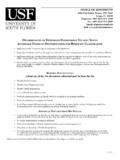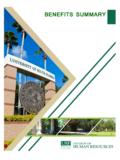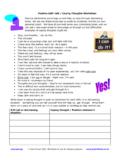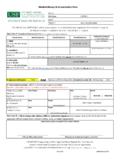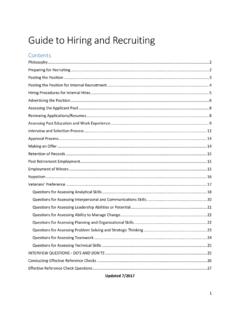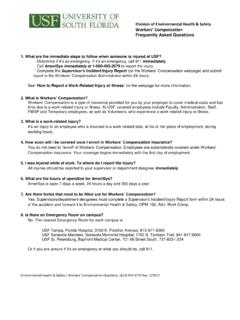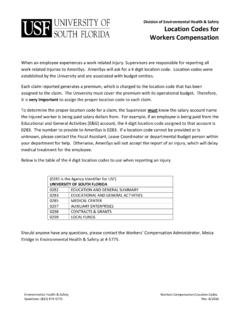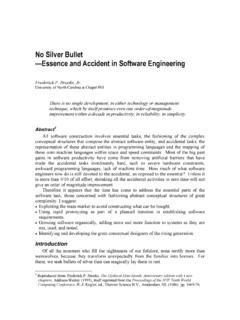Transcription of Reflection Template - University of South Florida
1 Adapted from: Ash, Clayton, & Moses. (2009). Learning through Critical Reflection : A Tutorial for Service-Learning Students. Raleigh, NC. Reflection Template DEAL Model for Critical Reflection Use the following prompts to create a comprehensive Reflection piece detailing your civic engagement experience and what you learned from it. Step 1: Describe Describe your experience objectively. Answer the following prompts: What did you do? Where did you do it? Who were you working with and/or for? When did this happen? Why did you do it? What did you say or otherwise communicate? Who else was there? What did others do? What actions did you/others take? Who didn t speak or act? What else happened that might be important ( , equipment failure, weather-related issues, etc.)
2 Step 2: Examine Examine your experience in terms of ONE of the following four learning outcomes: civic knowledge, civic skills, civic values, or civic motivation. Answer the prompts associated with ONE of the four learning outcomes listed below. Civic Knowledge (Intersection between academic enhancement and civic learning) Did any academic concepts become apparent during this experience? Were any academic concepts utilized to reach the goal you were trying to accomplish? How so? Did you need to change your approach after new information and experiences were presented to you? What do the differences between your textbook and your experience in the community suggest about changes that may be needed in the policies that affect the individuals your partner organization serves?
3 How can you or others in the community use what you learned about the course material and are there any challenges associated with doing so? Did this experience differ from your initial expectations? Why or why not? How does your civic engagement experience and academic knowledge inform your understanding of systemic causes of the social, political, or civic issue on which you are focused? Adapted from: Ash, Clayton, & Moses. (2009). Learning through Critical Reflection : A Tutorial for Service-Learning Students. Raleigh, NC. Civic Skills (Intersection between civic learning and personal growth) What was the goal you were trying to accomplish? Were you able to effectively achieve your goal? Why or why not? Which skills did you bring to the experience that helped you meet your goal?
4 How did your skills contribute to the diversity of the people with whom you worked? And how did you approach the harnessing of those differences for maximal effectiveness? Did you form any new assumptions that required you to change your approach? How so? Did you acquire any new skills by having to work to achieve this goal? Was this an easy or a difficult task to undertake? Why? Did you recruit others to help accomplish your goals or raise awareness of the problem you are actively trying to address? Why and how? Or Why not? Civic Values (Intersection between personal growth and civic learning) How did your strengths and weaknesses contribute to working towards the goal you were trying to accomplish? What were the positive and negative effects of these personal characteristics?
5 What assumptions did you bring? And what new assumptions did you need to form as you undertook this process? Did your assumptions about members of the community make your experience more or less successful when accomplishing your objectives? Did your personal values regarding civic engagement play a role in helping you to accomplish your goal? How and why? Or why not? What effect did you and this experience have on others? In evaluating the plan in light of its benefits and challenges, did you recognize any need for you to change personally? How so? Civic Motivation Did this experience increase your sense of responsibility for acting on behalf of others? Did this experience have any influence on your future educational or career path? What personal knowledge and skills did you discover or acquire during this experience that will assist you in your future endeavors in this area?
6 Did this experience inspire you to continue a commitment to serving others? What steps have you taken - or do you plan to take - to implement this plan of continued commitment? Adapted from: Ash, Clayton, & Moses. (2009). Learning through Critical Reflection : A Tutorial for Service-Learning Students. Raleigh, NC. Step 3: Articulate Learning Use your responses to the prompts above in both the Describe and Examine sections of this Reflection Template to create a thoughtful essay wherein you articulate what you have learned from your civic engagement experience. Each of the following questions should be addressed in your essay: What did I learn? How did I learn it? Why does it matter? What might/should be done in light of it? The essay should be formatted as follows: Reflection Essay Title (This should reflect the central focus of what you learned) By: Your Name goes here Student Learning Outcome Area: (This is where you name the outcome area in which you examined your experience: civic knowledge, civic skills, civic values, civic motivation) I learned that.
7 I learned this when .. This learning matters .. In light of this learning.
